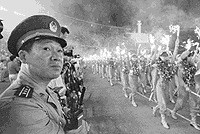![[ OPINIONS ]](/images/opinions97.gif)
Reflections on Hong Kong
![[photograph]](02_2_i.gif)
|
Jing-shen Tao
|
Yesterday, Hong Kong was handed over by Britain to China. It was a very important moment in history.
In this century, every Chinese student learns about the humiliations inflicted upon China by the Western powers and Japan. The defeat of China by Britain in the Opium War and the cession of Hong Kong to the British in 1842 marked the beginning of the foreign encroachment of China. With the signing of a series of unequal treaties between China and the foreign powers, China lost territories and was forced to open up the "treaty ports" for trade. The powers established "spheres of influence" in different regions and "concessions" or self-governing communities in a few cities, where their subjects enjoyed extraterritorial rights. When the first and most salient symbol of the humiliation of China was removed on July 1, 1997, it was indeed a day of rejoicing and celebration by all the people in China as well as many people of Chinese origin all over the world.
Hong Kong is a unique place and has played a vital role in the modern history of China. Originally a small fishing village, it has been a prosperous commercial and financial center in East Asia. Under British colonial rule, though the people only began to experience democracy a few years ago, they have enjoyed freedom for more than a century. With the exception of Japanese invasion and occupation during the second World War, most people have not directly experienced the turmoil, the revolutions, and, since 1949, the various movements in China. In many ways Hong Kong has influenced the modernization of China. It contributed to the success of the Republican Revolution of 1911. It was a haven for refugees. It was a window through which the China watchers cou ld speculate what was happening behind the "bamboo curtain" in China for decades. It has served as a bridge between China and the West. In the future, it may be a place where the practices of democracy would influence (or "subvert," as some Chinese leaders would say) China.
For now, Hong Kong is supposed to retain its capitalism and considerable autonomy according to the Basic Law agreed upon by Britain and China. Deng Xiaoping, the designer of the "one country, two systems" model for Hong Kong, believed that it would work, and he expected that it could also be applied to Taiwan, which has been considered by the Chinese leaders as a renegade province. Amidst all the celebrations, however, there is uncertainty...
I happened to be in Hong Kong in June, 1989 to witness the demonstrations
of Hong Kong citizens in support of the Chinese students' demands for
democracy. More than one million people protested on both May 21 and May
28. They demonstrated because if the  Communist rule in China could change for the better, they would be better off after 1997. The students at the Chinese University of Hong Kong bought many tents for the demonstrators in Beijing, and four students actually joined them in Tienanmen Square. Since June 4, 1989 people in Hong Kong have felt uncertain about the future. Some people who could afford to leave have already immigrated to the United States, Canada, Australia, and South Africa. You can find several magazines and newspapers with articles and advertisements dealing with the subject of immigration at the newsstands.
Communist rule in China could change for the better, they would be better off after 1997. The students at the Chinese University of Hong Kong bought many tents for the demonstrators in Beijing, and four students actually joined them in Tienanmen Square. Since June 4, 1989 people in Hong Kong have felt uncertain about the future. Some people who could afford to leave have already immigrated to the United States, Canada, Australia, and South Africa. You can find several magazines and newspapers with articles and advertisements dealing with the subject of immigration at the newsstands.
In late May this year I was again in Hong Kong for a few days. It appeared to me that business was as usual there. I talked to several of my former students about the future. I also discussed it with my friends and former colleagues at the Chinese University as well as a few others who are teaching in Hong Kong. My impression is that most businessmen are optimistic about the future, because they expect to have closer ties with China, and there will be more business. Many who had left are now returning fro m overseas. The universities have attracted a large number of scholars and technicians to help build Hong Kong as a high-tech center in Asia. The democrats and some, perhaps many, students and teachers are less optimistic. Whether Hong Kong will fare well largely depends on the policies of China. One thing is certain: most people believe that the leaders of China really want to carry out a good experiment in "one country, two systems." But many worry about the spread of corruption, the extension of authoritarianism, the deprivation of the freedom of speech and press and civil liberties. The sending of 8,000 troops and 20 tanks from China certainly make people nervous.
Despite the circumstances of uncertainty, the people are busy in making more and more money. Aside from buying stocks and investing in real estate, they are collecting everything that is related to this historical moment, including old bank notes and recently issued stamps which bear the portrait of the British Queen. One interesting note: Restaurants are celebrating the transition by offering "one country, two systems" dishes such as one duckling cooked in two ways.
Jing-shen Tao is a professor of Chinese History in the Department of East Asian Studies. In 1988-1990 he was on leave from the University of Arizona and worked as Chair Professor of History at the Chinese University of Hong Kong.



